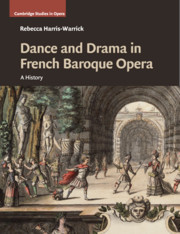Dance and Drama in French Baroque Opera A History Cambridge Studies in Opera Series
Langue : Anglais
Auteur : Harris-Warrick Rebecca

Examines the evolving practices in music, librettos, choreographed dance, and staging throughout the history of French Baroque opera.
Since its inception, French opera has embraced dance, yet all too often operatic dancing is treated as mere decoration. Dance and Drama in French Baroque Opera exposes the multiple and meaningful roles that dance has played, starting from Jean-Baptiste Lully's first opera in 1672. It counters prevailing notions in operatic historiography that dance was parenthetical and presents compelling evidence that the divertissement - present in every act of every opera - is essential to understanding the work. The book considers the operas of Lully - his lighter works as well as his tragedies - and the 46-year period between the death of Lully and the arrival of Rameau, when influences from the commedia dell'arte and other theatres began to inflect French operatic practices. It explores the intersections of musical, textual, choreographic and staging practices at a complex institution - the Académie Royale de Musique - which upheld as a fundamental aesthetic principle the integration of dance into opera.
Introduction; Part I. Lully: 1. The dramaturgy of Lully's divertissements; 2. Constructing the divertissement; 3. Dance foundations; 4. Dance practices on stage; 5. Prologues; 6. The lighter side of Lully; Part II. The Rival Muses in the Age of Campra: 7. The muses take the stage; 8. Thalie, muse of comedy; 9. Thalie visits the fairs; 10. The contested comic; 11. Melpomène, muse of tragedy; 12. Melpomène adapts; 13. Terpsichore, muse of the dance; 14. In the traces of Terpsichore; Epilogue; Appendix 1. Works performed at the Académie Royale de Musique, 1695–1732, in which the impact of the comédie italienne can be seen; Appendix 2. A partial list of performances consisting of 'fragments', 1702–32; Appendix 3. The choreographies danced at the Opéra contextualized.
Rebecca Harris-Warrick is Professor of Music at Cornell University, New York. She has published widely on French Baroque music and dance, with excursions into nineteenth-century opera, and has prepared critical editions of ballets by Lully and of Donizetti's opera, La Favorite. Much of her scholarly work has been informed by her interests in performance; she has studied early dance and performed as a Baroque flutist. She serves on the editorial boards for the Les Oeuvres complètes de Jean-Baptiste Lully and the Journal of the Society for Seventeenth-Century Music. Her research has been supported by fellowships from the National Endowment for the Humanities, the Mellon Foundation, and the Guggenheim Foundation.
Date de parution : 01-2019
Ouvrage de 504 p.
19x24.5 cm
Date de parution : 10-2016
Ouvrage de 502 p.
18x25.4 cm
Thème de Dance and Drama in French Baroque Opera :
© 2024 LAVOISIER S.A.S.



